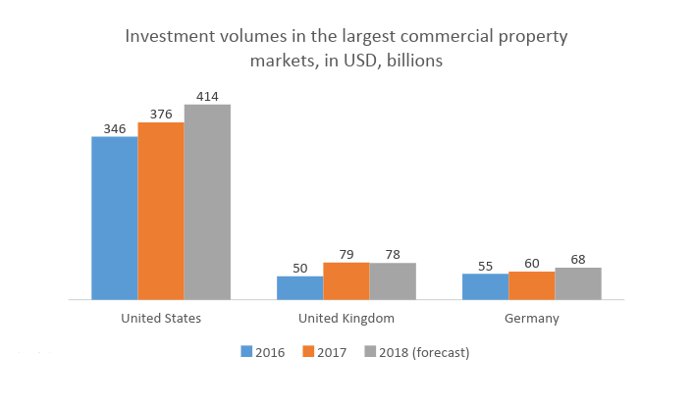Overseas real estate: 2018 results and what to expect in 2019
Transaction volume grew by 5% in 2018, but will return to 2017’s level in 2019
The volume of commercial property transactions concluded in 2017 has amounted to $698b. According to JLL, transactions volume of the global real estate market for the first three quarters of 2018 increased 7% year-on-year to $507b. Preliminary estimates suggest that the total amount for the full year will reach $730b. However, in 2019, experts predict a slight decrease in investment activity, suggesting a decrease to $700b.
The number of cross-border transactions in the global property market has been on a rise in recent years with the total investment volume increasing from 25% in 2009-2011 to 32% in 2017.
Money is heading in both directions: investors from developing markets are investing in developed markets and vice versa, but it’s more about the former than the latter. We anticipate a further increase in the share of cross-border transactions as the world becomes more globalised and closer together, while local risks are encouraging people to invest in other regions for diversification.”
On the future growth of ECB rates and risks of adjustment of property and bond prices:
“We think that growth rates in Europe will be slow because if growth is too rapid, weaker European economies will face high bankruptcy risks. We understand, however, that the risks of adjustment are high, and therefore, we recommend investing in value-added projects with potentially high yields starting from 20%, short-term implementation horizons (of about two years) and low risks of capital loss.”
George Kachmazov, managing partner at Tranio
Investors from the Asia Pacific became world leaders for the first time in 2017, despite China toughening capital controls
In 2017, the aggregate amount of foreign commercial property transactions concluded by investors from the Asia Pacific region exceeded the volume of the cross-border transactions involving investors from North America and Europe for the first time: $90b versus $83b and $81b, respectively, as calculated by Knight Frank.
The main investment donor from the Asia Pacific is China. The volume of direct Chinese investment in real estate in 2017 grew by 8% year-on-year, reaching $35.5b. PwC observed that the flow of Chinese investment shrank by 1.5 times. However, this decline was offset by the investment into UK, which tripled.
However, statistics show that in H1 of 2018, Chinese investments abroad nosedived to $5.3b (from $25.6b during the same period of 2017). Experts associate this with the toughening capital outflow controls in the country.
I suppose that the severity of controls is unlikely to lead to a real decline in investment activity. More probably, it is increasing transaction costs, as solutions for capital withdrawal offered by providers are camouflaging the capital flow from the official statistics. In practice, we are observing universal growth in the activity of Chinese buyers, for which reason we have launched a Chinese version of Tranio's website.
US remains the world's largest real estate market
US continues to be the world's largest commercial property market by transaction volume, despite dynamic fluctuations observed in recent years. That way, the total transaction amount in 2017 has come to $376b, around 8% less than in 2016. However, over the first three quarters of 2018, the investment volume in US property increased by 14% to $341b. The total transaction volume has risen by 10% year-on-year in 2018, according to estimates from JLL. The dramatic decline in investment coming from China most notably affected the commercial property markets of New York (where the total transaction amount decreased by 54%) and San Francisco (where it dropped by 52%), the two cities accounting for two-thirds of the total Chinese investment in US properties.

UK delivers growth despite Brexit
The UK is the most active European property market, which attracted about $79b in 2017, 37% more than the year before. The biggest UK property buyers were investors from the Asia Pacific, who spent $19.8b in 2017. JLL analysts observed remarkable activity by investors from Hong Kong and mainland China in the office segment of London's property market. In early 2018, JLL expected the investment activity in the UK market to decline slightly; they estimated that the total transaction amount in 2018 would reach approximately $78b.
Time will show the impact of Brexit on the UK. We believe the economy of the United Kingdom to be sufficiently reliable. Our investors there are interested in constructing inexpensive residential properties and micro-apartments, as well as projects with great ability for resilience against the potential price adjustment.
Germany continues to attract international investors
Germany's property market is Europe’s second largest by transaction volume. While the UK experts are conservative about the prospects of the British market, Germany is showing stable growth. In 2017, the transaction volume has reached €60b (twice that of 2012), and during the first three quarters of 2018, this figure increased by 8% year-on-year, coming to €48b. JLL experts believe the total annual transaction volume amounts to €68b.
Over half of the transactions involve international investors. Germany is the Europe's most important foreign real estate market for European and US investors and the second most attractive for investors from Asia and the Middle East.
What investment vehicles to choose in Germany?
|
Costs, € |
Yield, % per annum |
|
|---|---|---|
|
Micro-apartments |
from 150,000. |
3.5-4.5 |
|
Hotels |
From 5mn |
4.5-6.0 |
|
Senior homes |
From 5mn |
5-7 |
|
Renovation |
from 400,000 |
5-6 |
|
Development |
From 1.5mn |
8.0-15.0 |
To those who seek to invest in development, we recommend considering projects with a guaranteed rental flow. Then, the investor obtains a rental yield if the property takes more time to get sold than originally expected. Despite the rental yield being lower than the sale yield, it is still better option than not being able to sell the property and the bank requesting to add more capital or threaten to take the property away.”
Greece: Price gains, high yields, and a European residence permit
Greece is a promising investment destination in Europe. The price per square metre there is lower than in many of the EU countries, for which reason the rental business in Athens yields 5-7% versus 3-4% in other European tourist destinations. There is also a great potential for growth: Tranio experts anticipate real estate to grow by 30-40% in value over the next few years. Here are a few reasons:
- The Greek economy is in recovery, with GDP steadily growing since mid-2017;
- Greece set a new record in tourism: in 2017, over 30 million foreign nationals visited the country, and in H1 of 2018 this figure grew by 23% in comparison to the previous year;.
- Being the cheapest in Europe, Greece's residence-by-investment programme has been attracting investors: by September 2018, 3,400 applicants had obtained Greek golden visas;
- Property prices have grown for four straight quarters for the first time since 2008;
- In 2017, the volume of direct foreign investment in real estate has doubled.
One of the main factors in determining the future vector of the global real estate development will be the technology. It will change most real estate investment formats; many property types will face challenges and liquidity loss. For instance, online banking, the proliferation of drones and self-driving cars will cause the demand for retail property to fall: new technologies will allow people to receive services remotely, while goods will be delivered to clients automatically. Warehousing property will benefit from this situation. We can already see rapid growth in interest towards logistics real estate worldwide. On the other hand, the lease of residential property, such as serviced apartments, for example, is more than likely to remain of immediate interest even in the next decade, as people will always need a place to sleep. For this reason, our investment activity is mainly targets properties designed for residential purpose.
We will send you a content digest not more than once a week
